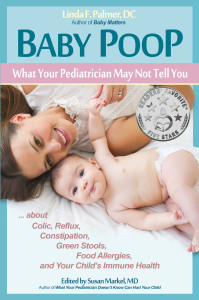 The following excerpt from “Baby Poop,” by Linda F. Palmer, is intended for the parents of preemies to share with their healthcare professionals in order to help optimize the outcome for their tiny baby. Please note that there are comments after most endnote references at bottom. There is much more valuable information in “Baby Poop” about feeding preemies.
The following excerpt from “Baby Poop,” by Linda F. Palmer, is intended for the parents of preemies to share with their healthcare professionals in order to help optimize the outcome for their tiny baby. Please note that there are comments after most endnote references at bottom. There is much more valuable information in “Baby Poop” about feeding preemies.
F o r t i f y H u m a n M i l k ?
Often pediatricians are determined to provide animal milk-derived fortifications to human milk feedings, even when mother’s and donor milks are ample. These are called human milk fortifiers, although they are derived from cow milk. Many recent studies that discuss use of human milk in preemies use language such as “though nutritional fortification is necessary,” without ever demonstrating exactly why it is necessary. Formula suppliers boast of faster weight gains when their fortifiers are used, and this is a consistent finding, but it is well shown that feeding of cow products is also consistently associated with greatly increased chances of necrotizing enterocolitis, respiratory infections, other infections (sepsis), and other health risks including reduced survival. Re-hospitalizations are also more frequent in preterm infants who had been receiving formulas.
 All the while, there is no evidence that faster weight gain is advantageous in human milk-fed infants. There is at least one study showing that faster early growth in preemies is neurodevelopmentally beneficial, but this study pays no attention to infant diet. One can assume no mainly or fully human milk-fed infants were in the study as it takes special attention to encourage this feeding or to seek these mothers out. So, it’s possible that growth may be positively linked to neurodevelopment in babies receiving only formula. Absorption of many of formula’s nutrients is a great challenge, therefore more formula, or a different balance of formula nutrients, may be required to provide adequate nourishment for the nervous system.
All the while, there is no evidence that faster weight gain is advantageous in human milk-fed infants. There is at least one study showing that faster early growth in preemies is neurodevelopmentally beneficial, but this study pays no attention to infant diet. One can assume no mainly or fully human milk-fed infants were in the study as it takes special attention to encourage this feeding or to seek these mothers out. So, it’s possible that growth may be positively linked to neurodevelopment in babies receiving only formula. Absorption of many of formula’s nutrients is a great challenge, therefore more formula, or a different balance of formula nutrients, may be required to provide adequate nourishment for the nervous system.
Another feeding choice, however, shows even better neurodevelopment than slow or fast growing formula-fed preemies. The studies that have taken diet into account show greater developmental and intellectual benefits to fully human milk-fed preemies, as well as overall survival benefits, even though their weight gain is slower. Regardless, this one study on predominantly formula-fed preemies is the one that is widely promoted and used to sell human milk fortifiers, unfoundedly praising faster growth. As each new fortifier is brought to market, their safety is tested and reported only as compared to other fortifiers, not compared to human-only feeding.
Neurologically, those preemies who do not receive any cow-derived products are found in many studies to have slightly higher IQs and other good neurodevelopmental indicators. The deficits are not necessarily caused by the cow milk products; rather, it appears to be the interruption of human milk influences, as studies reveal that breastfed infants also show slightly higher intellectual skills over those who receive soy formula. Though study reports about the intellectual advantages of breastfeeding are sometimes contested, researchers take these complaints into account; every new study is designed to address each additional factor accused of confounding research findings, such as mother’s education level or the family’s income.
Among the large number of available studies measuring developmental achievements in relation to diet, no suggestions are ever made of any intellectual or other neurological detriments associated with absence of formula supplements or human milk fortifiers, even when there is slower premature infant growth. It’s known that later catch-up growth occurs in breastfed preemies, so slower growth is not a concern in terms of final size. Although current thinking is strongly in favor of fortifying human milk with additions of cow milk products, I am unable to find one study that shows human milk fortifiers provide survival benefits; reduced disability, such as blindness or cerebral palsy; or other neurological or health benefits. I find only studies showing increases in early growth along with increases in illnesses, with formula additions to breastmilk.
With the evidence weighing so heavily against formula supplements to human milk and in favor of donor milk supplements when mother’s milk is not available, human milk fortifiers have been brought in as the new “necessity.” There are fewer studies on fortifiers available, but these are still just cow milk proteins and other components; they’re still cow milk formulas, just with altered balances of nutrients. The name “human milk fortifiers” was certainly given in attempt to set them apart from the negative study findings associated with preterm formulas.
Suggestions are that these fortifiers are needed chiefly to increase the amount of protein that a human milk-fed preemie receives. Studies use definitions of preemie protein requirements derived through different energy use measures. The studies do not base protein recommendations on overall survival and on developmental outcomes from use of their fortifiers. In fact, they do not even take into account the fact that human infants more easily assimilate human milk proteins than cow milk proteins.
A large analysis reviewed all pertinent studies of protein levels in preterm formulas through 2006. This review reported that, though higher protein levels led to faster growth, the (supposed) benefit “could not be weighed against the adverse consequences” of excess protein residues in the blood and neurodevelopmental abnormalities. Researchers haven’t even proven greater protein to bring more benefits than detriments among formula-fed preemies.
With speed of growth not shown to provide any health, development, or survival benefits in preemies, I believe ultimate survival, neurological development, and lack of other disabilities are the parameters of greater importance. These are found to be improved with purely human milk-derived diets for prematurely born and small for gestational age infants.
I’m sure you’ve tired now of my growth versus outcome arguments, but there is another consideration I need to mention. Researchers have reported that the slower growth of preemies associated with human milk feedings directly leads to reduced risks of future, potentially life-shortening diseases such as obesity, diabetes, heart disease, and possibly cancer.
And one final issue is that of bone density. Complaints are that several bone nutrients are lower in breastmilk than the estimated needs of preterm babies, which presents another opportunity for the promotion of fortifiers. Sometimes bone growth indicators are lower in human milk-fed preemies than in those fed formulas. Researchers find, however, that preemies eventually catch up to their term-born counterparts. Formula supplements or fortifications of breastmilk may increase bone indicators for a few months, but they do not provide any long-term bone advantages. In fact, the more unfortified human milk a set of study subjects received as premature infants, the greater whole body bone size and density they exhibited at 20 years of age.
ENDNOTES:
Anderson, J. W., et al. Breast-feeding and cognitive development: A meta-analysis. Am J Clin Nutr 70, no. 4 (Oct 1999): 525–35. [Significantly higher IQs for breastfed children.]
Andres, A., et al. Developmental status of 1-year-old infants fed breast milk, cow’s milk formula, or soy formula. Pediatrics 129, no. 6 (Jun 2012): 1134–40. [Cognitive advantage for term infants breastfed over soy formula fed.]
Brion, M. J., et al. What are the causal effects of breastfeeding on IQ, obesity and blood pressure? Evidence from comparing high-income with middle-income cohorts. Int J Epidemiol 40, no. 3 (Jun 2011): 670–80. [Takes a different approach to removing potential confounding causes, reconfirming strength of breastfeeding in promoting IQ and heart health indicators.]
Dusick, A. M., et al. Growth failure in the preterm infant: Can we catch up? Semin Perinatol 27, no. 4 (Aug 2003): 302–10. [Earlier preterms have slower growth. States that breastfed require fortification but the only reason given is growth before 9 months. No developmental deficits and no reduced head circumference are found in breastmilk-fed.]
Ehrenkranz, R. A., et al. Growth in the neonatal intensive care unit influences neurodevelopmental and growth outcomes of extremely low birth weight infants. Pediatrics 117, no. 4 (Apr 2006): 1253–61. [Improved neurodevelopment with faster growth in likely, chiefly, formula-fed infants. No considerations/comparisons made of human milk in diets.]
Faerk, J., et al. Diet, growth, and bone mineralization in premature infants. Adv Exp Med Biol 501 (2001): 479–83. [Fully human milk-fed preemies experienced slightly slower growth and lesser early bone mineral content but no reduction in head circumference; an indicator of brain development.]
Fewtrell, M. S. Does early nutrition program later bone health in preterm infants? Am J Clin Nutr 94, no. 6 (Dec 2011): 1870S–1873S.
Forman, M. R., et al. Through the looking glass at early-life exposures and breast cancer risk. Cancer Invest 23, no. 7 (2005): 609–24.
Funkquist, E. L., et al. Growth and breastfeeding among low birth weight infants fed with or without protein enrichment of human milk. Ups J Med Sci 111, no. 1 (2006): 97–108. [Preemies with cow-derived protein fortifier added to their mother’s milk grew faster initially, had more illnesses, and had poorer later breastfeeding, whereas full breastfeeding led to later growth improvement.]
Gross, S. J. Bone mineralization in preterm infants fed human milk with and without mineral supplementation. J Pediatr 111, no. 3 (Sep 1987): 450–8.
Jimenez-Chillaron, J. C., & Patti, M. E. To catch up or not to catch up: Is this the question? Lessons from animal models. Curr Opin Endocrinol Diabetes Obes 14, no. 1 (Feb 2007): 23–9.
Kramer, M. S., et al., & Promotion of Breastfeeding Intervention Trial Study Group. Breastfeeding and child cognitive development: New evidence from a large randomized trial. Arch Gen Psychiatry 65, no. 5 (May 2008): 578–84. [“…strong evidence that prolonged and exclusive breastfeeding improves children’s cognitive development.”]
Lucas, A., et al. Breast milk and subsequent intelligence quotient in children born preterm. Lancet 339, no. 8788 (Feb 1992): 261–4. [At age 8, IQ advantages remained in children who received breastmilk as premature infants, averaging 8 points, after accounting for factors of mother’s education, choice of feeding, and other potential confounders.]
Lucas, A., & Cole, T. J. Breast milk and neonatal necrotising enterocolitis. Lancet 336, no. 8730 (Dec 1990): 1519–23. [In babies fed only formula, NEC occurred 6-10 times more often than in human milk alone. Of preemies over 30 weeks, NEC was 20 times more with formula vs. human milk.]
Morley, R., & Lucas, A. Randomized diet in the neonatal period and growth performance until 7.5-8 y of age in preterm children. Am J Clin Nutr 73, no. 3 (Mar 2000): 822–8. [Preterm diet of formula versus unfortified donor breastmilk had no influence on final size at 18 mos or 8 years, nor head circumference.]
O’Connor, D. L., et al. Growth and development of premature infants fed predominantly human milk, predominantly premature infant formula, or a combination of human milk and premature formula. J Pediatr Gastroenterol Nutr 37, no. 4 (Oct 2003): 437–46. [“…despite a slower early growth rate, human milk-fed low birth weight infants have development at least comparable to that of infants fed nutrient-enriched formula.” In this study, even head circumferences were slightly less in human milk fed, although cognitive indicators were better.]
Patel, A. L., et al. Impact of early human milk on sepsis and health-care costs in very low birth weight infants. J Perinatol 33, no. 7 (Jul 2013): 514–9. [The more human milk, the lower the risk of sepsis.]
Premji, S., et al. Does amount of protein in formula matter for low-birthweight infants? A Cochrane systematic review. J Parenter Enteral Nutr 30, no. 6 (Nov-Dec 2006): 507–14. [Preemies receiving higher amounts of protein grew faster but: “This benefit could not be weighed against the adverse consequences of elevated blood urea nitrogen levels and increased metabolic acidosis and neurodevelopmental abnormalities.”]
Quigley, M. A., et al. Breastfeeding is associated with improved child cognitive development: A population based cohort study. J Pediatr 160, no. 1 (Jan 2012): 25–32. [Improved cognitive abilities in 5 y.o. children who were born preterm, when fed breastmilk.]
Schanler, R. J. Outcomes of human milk-fed premature infants. Semin Perinatol 35, no. 1 (Feb 2011): 29–33. [Human milk-fed infants have improved motor and mental development, IQ, vision, and adolescent body composition, and reduced metabolic syndrome, over formula fed.]
Singhal, A., et al. Breastmilk feeding and lipoprotein profile in adolescents born preterm: Follow-up of a prospective randomised study. Lancet 363, no. 9421 (May 2004): 1571–8. [Teens born prematurely had less atherosclerosis if fed donor human milk rather than preterm formula.]
Singhal, A., et al. Early nutrition and leptin concentrations in later life. Am J Clin Nutr 75, no. 6 (Jun 2002): 993–9. [Preemies growing faster on enriched preterm formula showed greater leptin levels (propensity for obesity) as teens than those fed donor human milk.]
Singhal, A., et al. Low nutrient intake and early growth for later insulin resistance in adolescents born preterm. Lancet 361, no. 9363 (Mar 2003): 1089–97. [Slower growth diets for preterm infants led to fewer diabetes risk factors in teens.]
Vohr, B. R., et al. Beneficial effects of breast milk in the neonatal intensive care unit on the developmental outcome of extremely low birth weight infants at 18 months of age. Pediatrics 118, no. 1 (Jul 2006): e115–23. [Five IQ points higher for preterm infants receiving >80% breastmilk, versus none.]



[…] Newest related post: Fortify Human Milk for Premature Infants? […]
[…] Newest related post: Fortify Human Milk for Premature Infants? […]
[…] Newest related post: Fortify Human Milk for Premature Infants? […]
[…] Palmer, L. F. Fortify Milk for Premature Infants? Baby Poop, Sunny Lane Press, 2015. […]
[…] Fortify Human Milk for Premature Infants? de Baby Merde de Linda Palmer, 2015 […]
[…] Fortify Human Milk for Premature Infants? de Baby Merde de Linda Palmer, 2015 […]